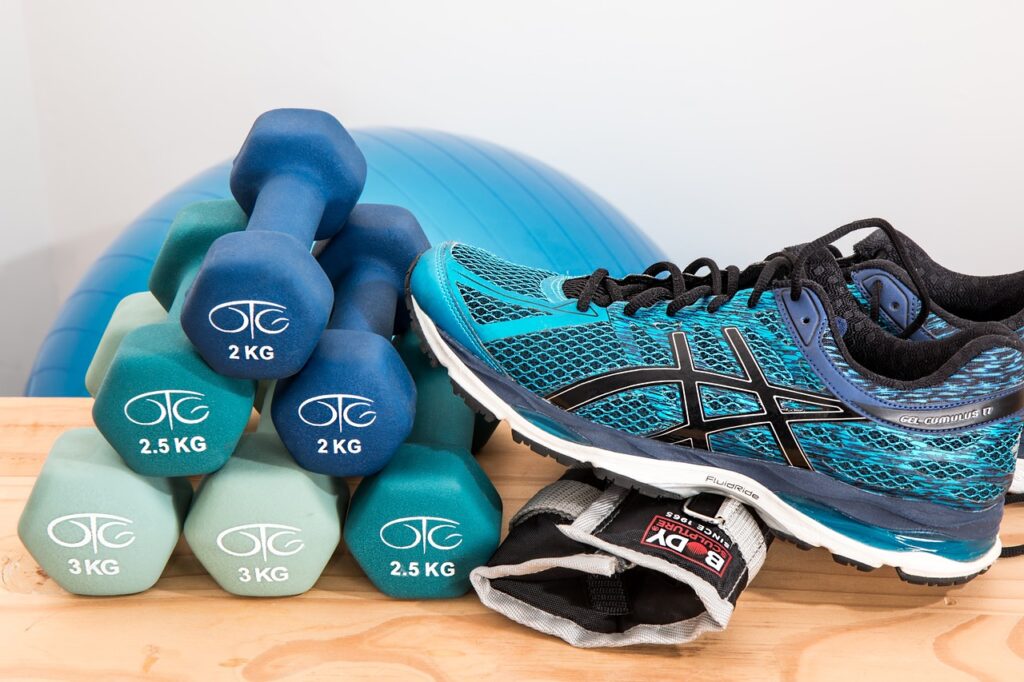Are you looking to boost your muscle growth and combat the effects of Sarcopenia? If so, you’re in the right place! In this article, we will explore the ultimate question: what grows muscle the fastest? Whether you are an older adult seeking to regain muscle strength or someone simply interested in maximizing your workout results, we have the answers and information you need. From the best muscle building products to effective techniques, get ready to unlock the secret to rapid muscle growth.

This image is property of pixabay.com.
Proper Nutrition
Proper nutrition is essential for supporting muscle growth and overall health. When it comes to building muscle, there are several key factors to consider in your diet.
Caloric Surplus
To promote muscle growth, it is important to consume a caloric surplus. This means consuming more calories than your body burns on a daily basis. The surplus provides the necessary energy for muscle growth and repair. However, it is important to strike a balance – consuming too many calories can lead to excessive weight gain.
Protein Intake
Protein is the building block of muscle tissue, making it crucial for muscle growth. Aim to consume an adequate amount of protein with each meal and snack throughout the day. Good sources of protein include lean meats, poultry, fish, eggs, dairy products, legumes, and tofu. It is recommended to consume around 0.8-1 gram of protein per pound of body weight for optimal muscle growth.
Carbohydrate Intake
Carbohydrates are the body’s primary source of energy and should not be neglected in your muscle-building journey. They provide the fuel needed for intense workouts and aid in muscle recovery. Focus on choosing complex carbohydrates such as whole grains, fruits, and vegetables, as they provide sustained energy and important nutrients.
Healthy Fats
While some fats should be limited for overall health and weight management, incorporating healthy fats into your diet is crucial for muscle growth. Monounsaturated and polyunsaturated fats, found in sources such as avocados, nuts, seeds, and fatty fish, provide essential fatty acids and help support hormone production and nutrient absorption.
Resistance Training
Resistance training is an essential component of any muscle-building plan. It involves using external resistance, such as weights or resistance bands, to work your muscles.
Compound Exercises
Compound exercises target multiple muscle groups at once, making them highly effective for muscle growth. Examples of compound exercises include squats, deadlifts, bench press, and pull-ups. By incorporating these exercises into your routine, you can maximize muscle engagement and overall strength.
Progressive Overload
To stimulate muscle growth, it is important to progressively overload your muscles over time. This means continually increasing the demands placed on your muscles by increasing the weight, repetitions, or intensity of your workouts. Gradually challenging your muscles helps stimulate adaptation and muscle growth.
Frequency and Volume
Finding the right balance between workout frequency and volume is important for optimal muscle growth. Aim to train each muscle group 2-3 times per week, allowing for adequate rest and recovery between sessions. The total volume, or the number of sets and repetitions performed, should be tailored to your fitness level and goals.
Form and Technique
Maintaining proper form and technique during resistance training is crucial for maximizing muscle growth and minimizing the risk of injury. Focus on performing each exercise with control and precision, engaging the targeted muscles throughout the movement. If you are unsure about proper form, consider working with a qualified personal trainer or seeking guidance from experienced individuals.
Supplementation
While proper nutrition and training form the foundation for muscle growth, certain supplements can complement your efforts and provide additional support.
Creatine
Creatine is one of the most studied and effective supplements for muscle growth and strength. It helps regenerate adenosine triphosphate (ATP), the primary energy source for muscle contractions. By increasing ATP availability, creatine allows for more intense and prolonged workouts, leading to greater muscle growth over time.
Branched-chain Amino Acids (BCAAs)
BCAAs, specifically leucine, isoleucine, and valine, are essential amino acids that play a vital role in muscle protein synthesis and muscle recovery. Consuming BCAAs before, during, or after workouts can help promote muscle growth, reduce muscle soreness, and enhance exercise performance.
Whey Protein
Whey protein is a popular and easily digestible protein source that can be beneficial for muscle growth. It provides a complete amino acid profile, including high levels of essential amino acids and BCAAs. Consuming whey protein after workouts can help jumpstart the muscle recovery process and promote muscle protein synthesis.
Beta-Alanine
Beta-alanine is an amino acid that can enhance exercise performance and reduce muscle fatigue. By increasing muscle carnosine levels, beta-alanine buffers muscle acidity, allowing for improved endurance and the ability to push through intense workouts. This, in turn, can support muscle growth and performance gains.
Adequate Rest and Recovery
Rest and recovery are crucial aspects of muscle growth. Without proper rest, your muscles do not have the opportunity to repair and rebuild, potentially hindering your progress.
Sleep Quality and Quantity
Getting adequate sleep is essential for muscle growth and overall health. During sleep, the body releases growth hormone, which plays a vital role in muscle repair and recovery. Aim for 7-9 hours of quality sleep each night to optimize muscle growth and support your overall well-being.
Active Rest Days
Incorporating active rest days into your training schedule is important for allowing your muscles to recover without being completely sedentary. Engaging in low-intensity activities such as stretching, yoga, or light cardio on rest days can enhance blood flow, promote muscle recovery, and help reduce muscle soreness.
Avoiding Overtraining
Pushing yourself too hard without adequate rest can lead to overtraining, which can negatively impact muscle growth and overall performance. Listen to your body and pay attention to signs of fatigue, excessive soreness, and decreased motivation. Incorporating regular rest days and adjusting your training intensity and volume when needed is crucial for avoiding overtraining.
Stretching and Foam Rolling
Stretching and foam rolling are important tools for promoting muscle recovery and flexibility. Incorporating dynamic stretching before workouts can help warm up the muscles and prepare them for exercise. After workouts, static stretching and foam rolling can help relieve muscle tightness, enhance blood flow, and support overall muscle recovery.

This image is property of pixabay.com.
Hormonal Balance
Achieving hormonal balance is essential for optimal muscle growth and overall health. Certain hormones play a significant role in muscle development and recovery.
Optimizing Testosterone Levels
Testosterone is a key hormone for muscle growth and strength. Engaging in resistance training, maintaining a healthy body weight, and consuming adequate amounts of healthy fats can help support optimal testosterone levels. However, it is important to note that hormone levels are also influenced by factors such as genetics and age.
Balancing Cortisol Levels
Cortisol, often referred to as the stress hormone, can have a negative impact on muscle growth when elevated for extended periods. Managing stress levels through techniques such as meditation, deep breathing exercises, and engaging in activities you enjoy can help support healthy cortisol levels and prevent muscle breakdown.
Regulating Growth Hormone
Growth hormone plays a crucial role in muscle repair and growth. Optimizing growth hormone levels can be achieved through factors such as quality sleep, proper nutrition, and regular, intense exercise. While natural production declines with age, these lifestyle factors can still influence growth hormone release.
Hydration
Proper hydration is often overlooked but plays a vital role in muscle growth and overall performance.
Importance of Water
Staying properly hydrated is essential for optimal muscle function and overall health. Water supports nutrient transport, waste removal, and temperature regulation. Aim to consume adequate amounts of water throughout the day, especially during workouts, to support muscle growth and prevent dehydration.
Electrolyte Balance
Electrolytes, such as sodium, potassium, and magnesium, are minerals that help regulate fluid balance, muscle contractions, and nerve function. Ensuring an adequate intake of electrolytes through a balanced diet and, if needed, sports drinks or electrolyte supplements can help support muscle function and prevent muscle cramps.
Pre- and Post-Workout Hydration
Proper hydration around your workouts is crucial for optimizing performance and muscle growth. Before exercise, aim to drink water or a sports drink to ensure adequate hydration. After workouts, replenish lost fluids by consuming water or a recovery drink that contains a combination of carbohydrates and electrolytes.

This image is property of pixabay.com.
Meal Timing
In addition to what you eat, when you eat can also impact muscle growth and performance.
Pre- and Post-Workout Meals
Consuming a balanced meal or snack before and after workouts provides the necessary fuel and nutrients for muscle growth and recovery. Prioritize a combination of carbohydrates and protein before workouts to provide energy, and after workouts, focus on replenishing energy stores and supporting muscle repair with a mix of carbohydrates and protein.
Meal Frequency
The frequency at which you eat can influence muscle growth and overall metabolism. Consuming smaller, balanced meals and snacks throughout the day can provide a steady supply of nutrients and support muscle protein synthesis. Aim for 4-6 meals or snacks spaced evenly throughout the day to optimize muscle growth and recovery.
Nutrient Timing
Timing your nutrient intake can also impact muscle growth. Consuming protein and carbohydrates within the first hour after a workout is believed to enhance muscle recovery and promote muscle protein synthesis. Additionally, spacing out your protein intake evenly throughout the day can provide a steady supply of amino acids for muscle repair and growth.
Genetics and Age
While factors such as proper nutrition and training play significant roles in muscle growth, it is important to recognize that individual differences, including genetics and age, can influence the rate at which muscles grow.
Understanding Individual Differences
Each person’s body responds differently to training stimuli and nutrition. Some individuals may naturally have a higher potential for muscle growth, while others may struggle to see significant gains. It is essential to focus on your own progress rather than comparing yourself to others and to make adjustments to your training and nutrition based on your individual needs and goals.
Importance of Age on Muscle Growth
As we age, our body’s ability to build and maintain muscle mass naturally declines. This process, known as sarcopenia, can be combated through regular resistance training, proper nutrition, and lifestyle habits that support muscle growth and maintenance. While progress may be slower than in younger individuals, consistent effort and dedication can still lead to noticeable improvements.
Consistency and Patience
Building muscle is a journey that requires consistency, patience, and a long-term commitment.
Long-Term Commitment
Building muscle and achieving your desired physique is not an overnight process. It requires dedication, discipline, and a long-term commitment to a healthy lifestyle. Consistently following a well-rounded nutrition and training plan, along with other lifestyle factors like stress management and adequate rest, is key to achieving and maintaining muscle growth.
Progress Tracking
Tracking your progress is essential for staying motivated and making adjustments to your training and nutrition plans. Take measurements, track your body weight, and keep a training journal to record your workouts and track your strength gains. Regularly reviewing your progress can help you identify areas of improvement and celebrate the milestones along your muscle-building journey.
Avoiding Plateaus
As your body adapts to your training routine, it can reach a point where progress slows down or stalls. This is known as hitting a plateau. To overcome plateaus and continue making progress, it is important to continually challenge yourself by adjusting your training variables, trying new exercises, and periodically changing your routine. Staying consistent and committed during these plateaus will ultimately lead to breakthroughs and continued muscle growth.
Avoiding Muscle Loss
Preventing muscle loss is just as important as building muscle, especially as we age.
Reversing Sarcopenia
Sarcopenia, the age-related loss of muscle mass, can be combated through resistance training, proper nutrition, and an overall healthy lifestyle. Incorporating regular strength training exercises that target all major muscle groups, adequate protein intake, and lifestyle habits that support muscle growth can help slow down and even reverse the loss of muscle mass.
Maintaining Muscle Mass
Once you have built muscle, maintaining it is crucial for long-term health and functionality. By continuing to engage in regular resistance training, consuming adequate protein, and leading a physically active lifestyle, you can preserve and even further enhance your muscle mass. Additionally, regularly monitoring your nutrition, training, and other lifestyle factors and making adjustments when necessary can help prevent muscle loss.
Adapting Exercise Routine
As you age or encounter changes in your fitness goals, it is important to adapt your exercise routine accordingly. This may involve modifying the intensity, volume, or exercise selection to better suit your current abilities and needs. By being flexible and adjusting your routine as necessary, you can continue to challenge your muscles and stimulate growth while minimizing the risk of injury.



